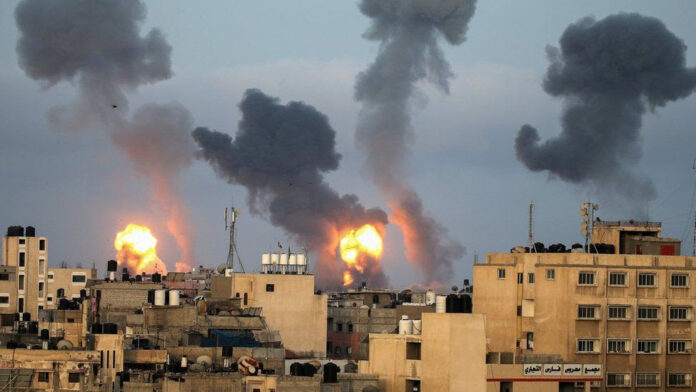Heavy exchanges of fire between Palestinian militants and the Israeli military continue, with at least 30 people killed in Gaza and Israel.
Militants have fired more than 400 rockets towards Israel since Monday night, killing two Israelis.
Israel says it hit 150 targets in Gaza in response. Health officials there say 28 Palestinians were killed.
The international community has urged both sides to end the escalation, which follows days of unrest in Jerusalem.
The militant group Hamas, which controls Gaza, said it was acting to defend Jerusalem’s al-Aqsa mosque from Israeli “aggression and terrorism” after the site, which is holy to Muslims and Jews, saw clashes between Israeli police and Palestinians on Monday that left hundreds injured.
- Dominic Ongwen: Former Ugandan child soldier jailed for war crimes
- Clean out our insides Ethiopia detains Tigrayans amid war
- Madrid election centers on virus response, rise of far right
Israeli Prime Minister Benjamin Netanyahu said Hamas had “crossed a red line” by firing rockets towards Jerusalem for the first time in years.
After a meeting with military chiefs on Tuesday afternoon, Mr Netanyahu warned that they had agreed to increase both the strength and the frequency of the Gaza strikes, adding that Hamas “will be hit in ways that it does not expect”.
The past few days have seen the worst violence in Jerusalem since 2017.
It followed mounting Palestinian anger over the threatened eviction of families from their homes in occupied East Jerusalem by Jewish settlers, fuelled by a month of altercations between protesters and police in the predominantly Arab part of the city.
The fundamental reason for the renewed violence does not change. It is the open wound of the unresolved conflict between Jews and Arabs that has blighted and ended Palestinian and Israeli lives for generations.
This latest episode has happened because of tension in Jerusalem, the sharpest part of the conflict. The holy sites in the Old City are national as well as religious symbols. Crises affecting them have often ignited violence.
The triggers for what has happened this time include heavy-handed Israeli policing of Palestinians during Ramadan and controversial efforts in the Israeli courts to evict Palestinians from their homes.
But other events could have had the same effect. This was a crisis waiting to happen, in a conflict that, once again, has been left to fester.
Leaders on both sides have concentrated on safeguarding their own positions.
The biggest challenge, of making peace, has not been addressed seriously for years.

What’s the latest on the ground?
The violence did not abate overnight and the sounds of Palestinian rocket fire and Israeli air strikes continued to echo across the region on Tuesday.
Two women, one in her 60s and the other in her 80s, were killed in a rocket attack on the southern Israeli city of Ashkelon on Tuesday, with one other person seriously injured, medics say.
At least 95 people have received treatment in Israeli hospitals as a result of the attacks.
Hamas said it had fired 137 rockets at Ashkelon and nearby Ashdod in the space of five minutes, and warned it had “many surprises” prepared if the fighting continued.
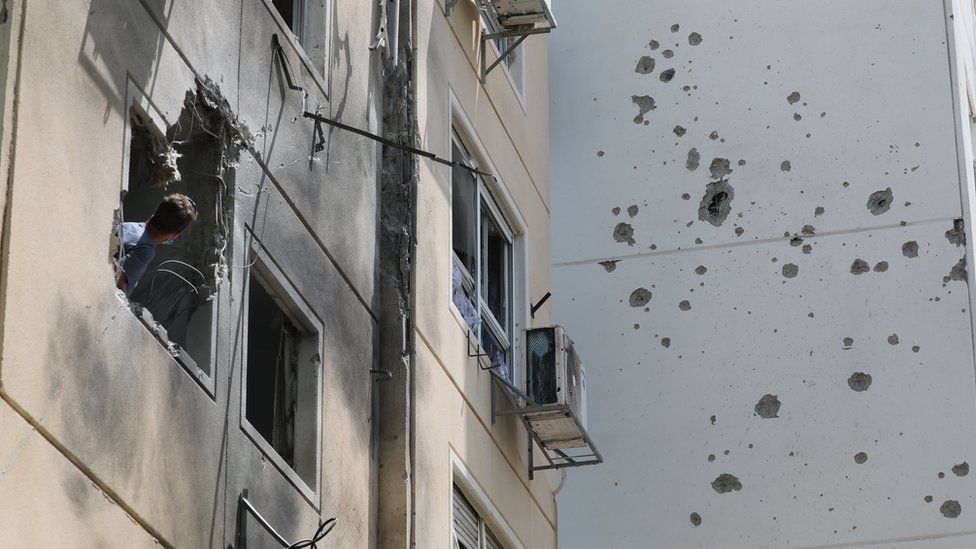
Earlier, the Israeli military said more than 300 rockets had been fired by militants since 18:00 (15:00 GMT) on Monday, and 90% of them had been intercepted by its Iron Dome missile defence system.
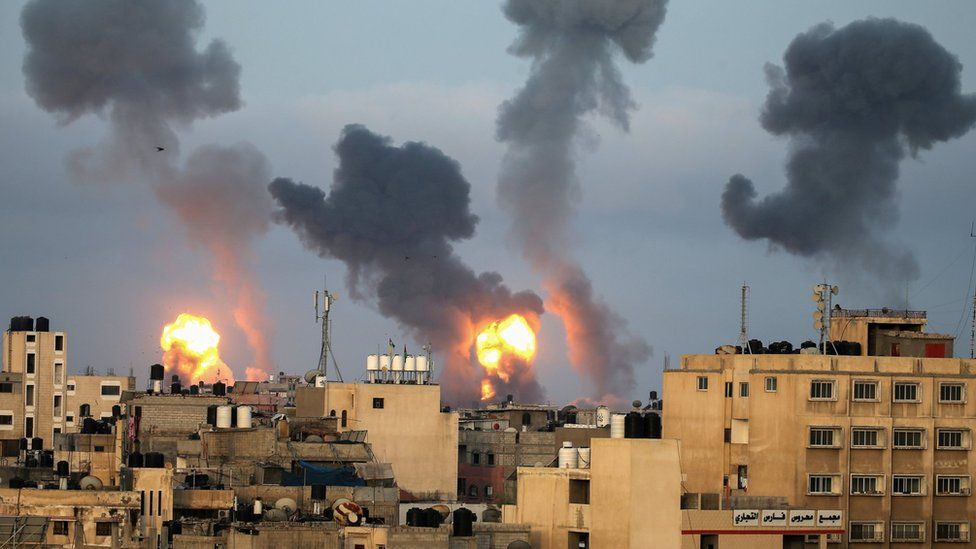
The Israeli military said it had struck 130 “terror targets” in Gaza overnight in response, including two attack tunnels being dug under the border with Israel.
Later, the military and the Shin Bet security agency announced that they had also killed the head of Islamic Jihad group’s special rocket unit, Samah Abed al-Mamlouk. Islamic Jihad confirmed the deaths of Mamlouk and two other senior figures in a strike on a building in central Gaza City.
The commander of a Hamas anti-tank missile unit was reportedly killed on Tuesday evening, as the Israeli military launched what it called “massive wave” of air strikes to neutralise Hamas’ rocket-launching capabilities in northern Gaza.
“The purpose of the operation is to strike Hamas hard, to weaken it and to make it regret its decision [to launch rockets],” Israeli Defence Minister Benny Gantz told reporters. “Every bomb has an address. We will continue this in both the coming hours and the coming days.”
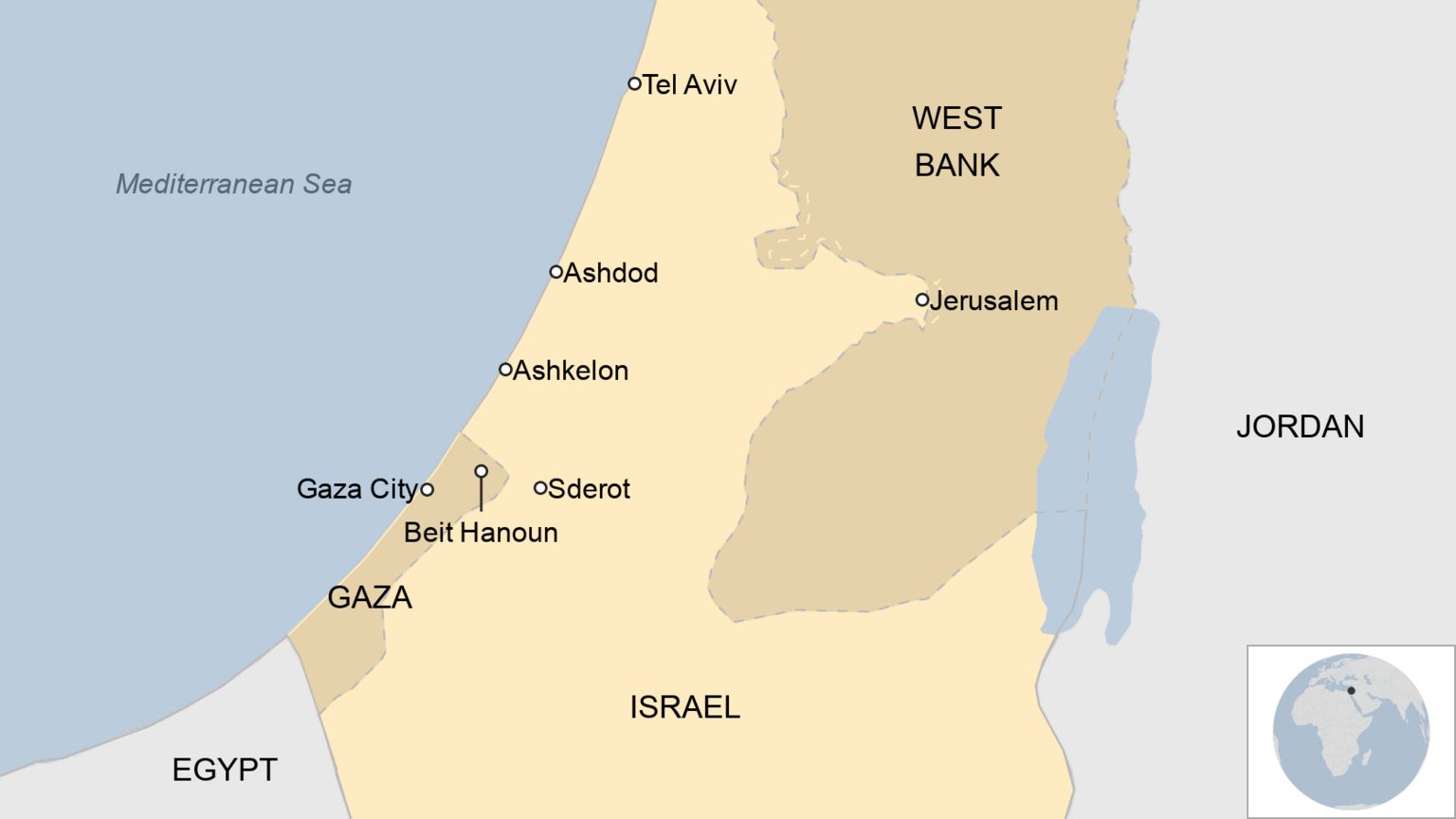
In Gaza on Tuesday evening, an Israeli air strike hit a 13-storey tower block, about an hour-and-a-half after residents and local people were warned to evacuate, Reuters news agency reports.
The Hamas-run health ministry in Gaza reported that at least 28 Palestinians, including 10 children, had been killed in Israeli strikes and more than 150 others had been injured.
It said a 59-year-old woman and her disabled son had died in an attack on Tuesday morning.
On Monday night, seven members of one family, including three children, died in an explosion in Beit Hanoun. The cause of the blast was not clear.
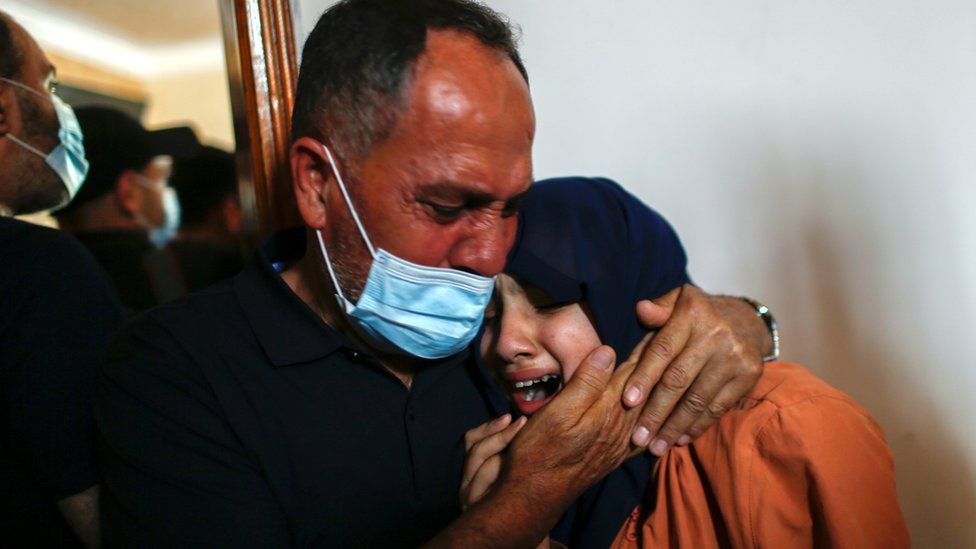
The Israeli military said at least 16 of those killed had been members of militant groups and that it took precautions to minimise possible harm to civilians.
“We do whatever we can in order to use the most precise munitions against militants and militants only. But the situation is almost impossible on the ground. Hamas and other terrorist organisations are embedding themselves within the civilian population,” spokesman Lt Col Jonathan Conricus told the BBC.
He also said that about one in three of the rockets fired by militants landed inside Gaza, potentially causing damage and civilian casualties inside the territory.
What’s the global reaction?
US Secretary of State Antony Blinken said Hamas must end the rocket attacks “immediately”, adding: “All sides need to de-escalate.”
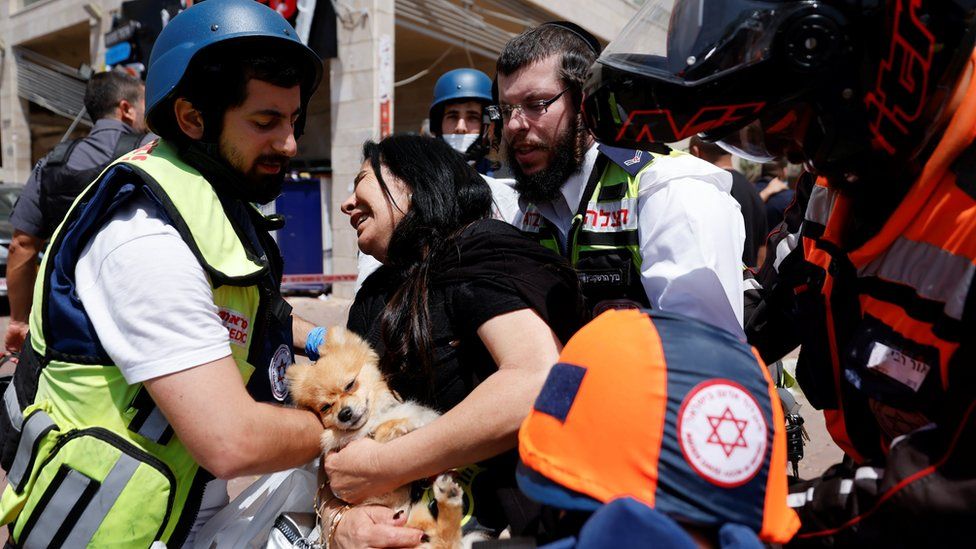
UK Foreign Secretary Dominic Raab tweeted that the violence in Jerusalem and Gaza “must stop” and called for “an immediate de-escalation on all sides, and end to targeting of civilian populations”.
A spokesman for the EU’s foreign policy chief, Josep Borrell, said the upsurge in violence “needs to stop immediately” and warned that rocket-fire targeting Israeli civilians “is totally unacceptable and feeds escalatory dynamics”.
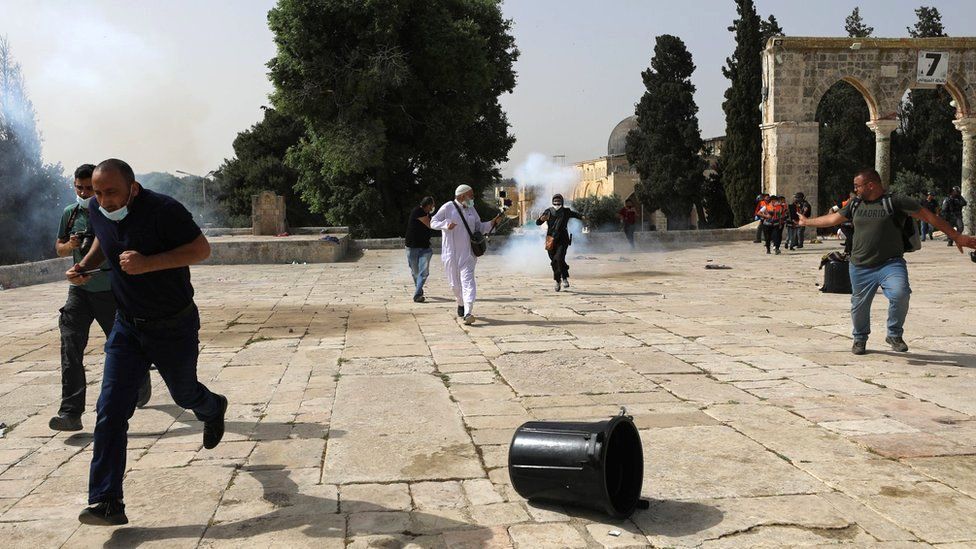
The UN human rights office said it was “deeply concerned” by the escalation and condemned “all incitement to violence and ethnic division and provocations”.
A Palestinian official told Reuters news agency that the UN, Egypt and Qatar were trying to negotiate an end to the fighting.
What has caused the violence?
The fighting between Israel and Hamas was triggered by days of escalating clashes between Palestinians and Israeli police at a holy hilltop compound in East Jerusalem.
The site is revered by both Muslims, who call it the Haram al-Sharif (Noble Sanctuary), and Jews, for whom it is known as the Temple Mount. Hamas demanded Israel remove police from there and the nearby predominantly Arab district of Sheikh Jarrah, where Palestinian families face eviction by Jewish settlers. Hamas launched rockets when its ultimatum went unheeded.
Palestinian anger had already been stoked by weeks of rising tension in East Jerusalem, inflamed by a series of confrontations with police since the start of the Islamic holy month of Ramadan in mid-April.
It was further fuelled by an expected court ruling on the fate of the families in Sheikh Jarrah – ultimately postponed because of the unrest – and Israel’s annual celebration on Monday of its capture of East Jerusalem in the 1967 Middle East war, known as Jerusalem Day.
The fate of the city, with its deep religious and national significance to both sides, lies at the heart of the decades-old Israel-Palestinian conflict. Israel in effect annexed East Jerusalem in 1980 and considers the entire city its capital, though this is not recognised by the vast majority of other countries.
Palestinians claim the eastern half of Jerusalem as the capital of a hoped-for state of their own.
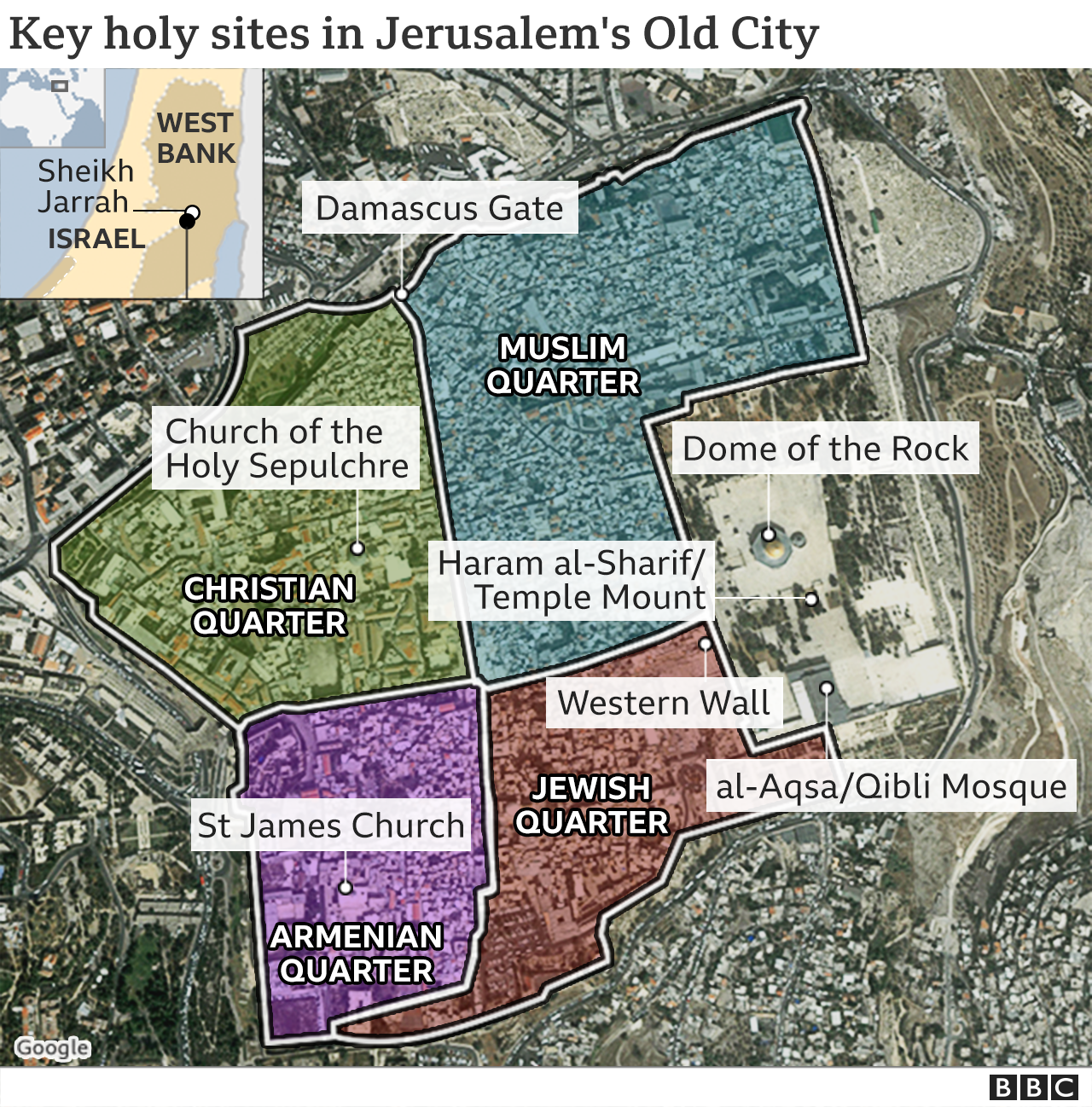
SOURCE: BBC


